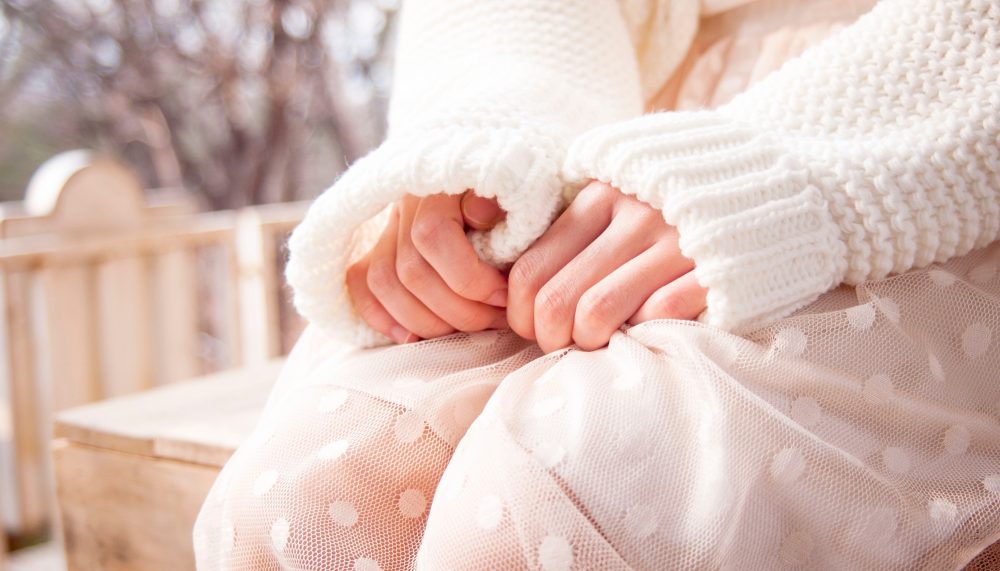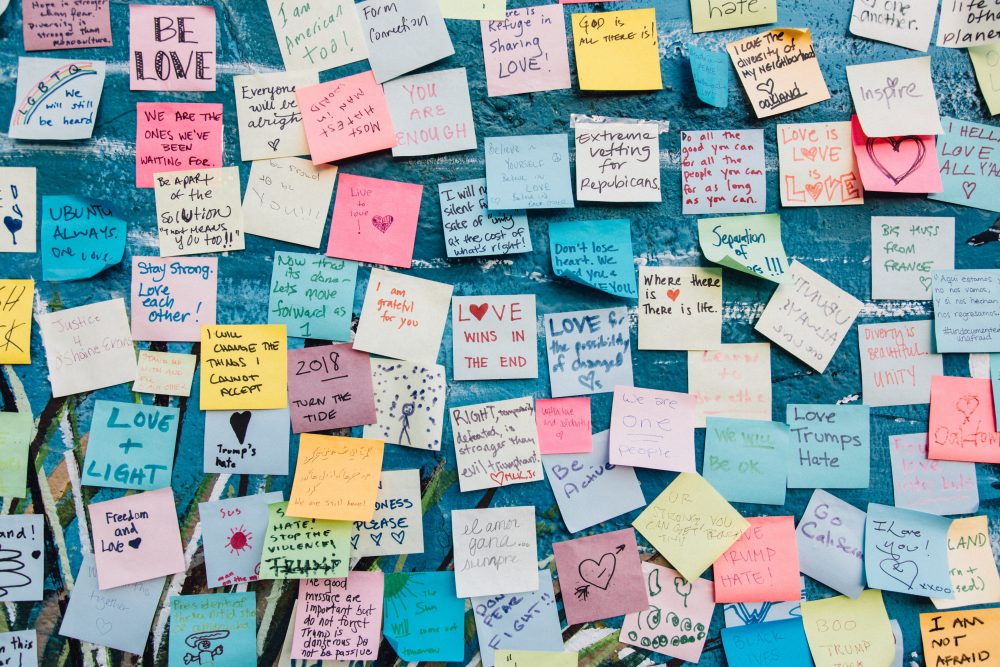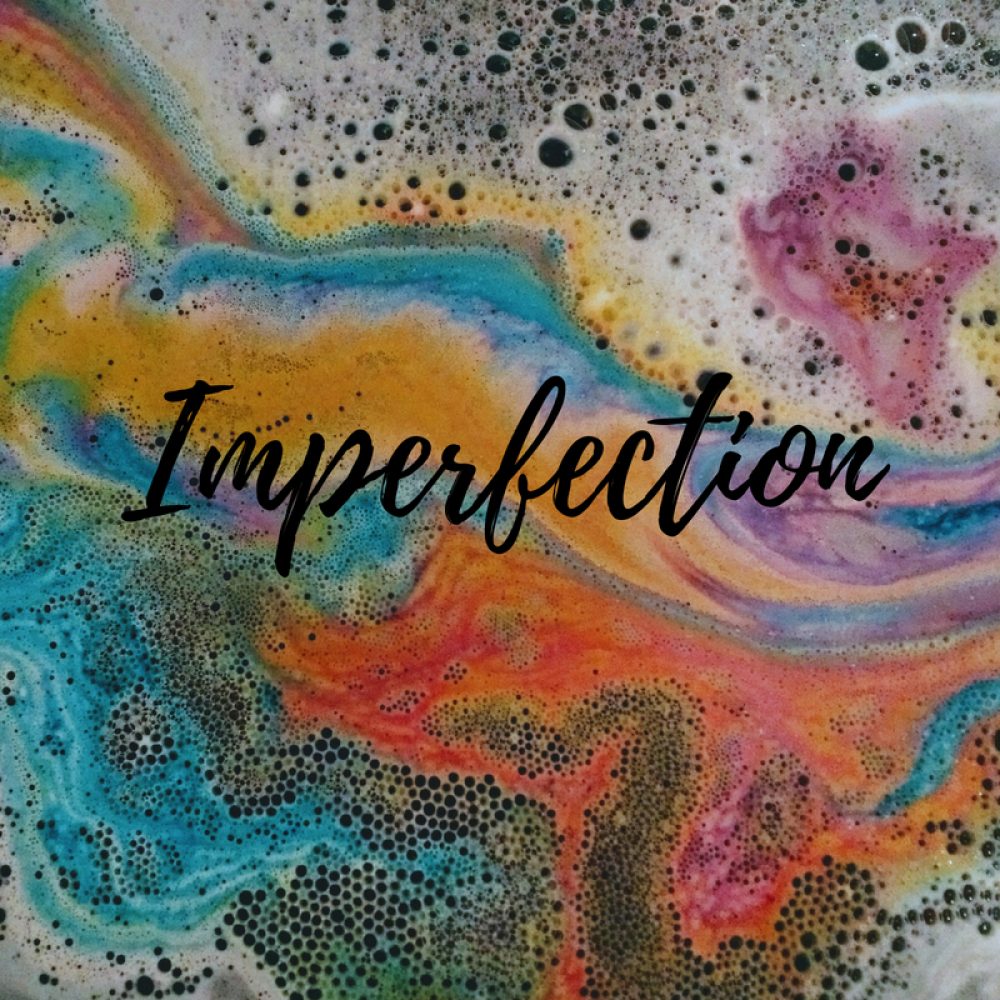You're on the Young People Site
Dedicated to self-harm recovery, insight and support.

The blog below was written by Gill Peck. Gill works as a Service Manager for Community Partnerships. She is passionate about emotional wellbeing; enjoys meeting people from all walks of life and journeying with them to reach their full potential.
That voice.
That voice.
That voice that creeps in, it lingers, hanging around when it knows it isn't welcome. That voice which can be self critiquing about my appearance. That tells me nothing looks good on me as I get ready to go to work in the morning; which makes me think for a while I am all that I can see in the mirror. That voice. That voice that makes me doubt the size I actually am. Knowing I'm a healthy size 10 yet the mirror making me feel dissatisfied at times with the reflection looking back at me. That voice that then makes me annoyed, knowing it isn't welcome and I shouldn't listen to it. Knowing I've developed a healthy relationship with food, no longer comfort eating my emotions away.
But If I could change one thing it would be that voice. That voice that pops up once in a while and then stays a little longer than welcome.
Over the years I've learnt to become more and more satisfied with life, with what I have and enjoying life in the present, not wishing for the future or longing for the past.
Yet that voice still pops up every now and then... And when it does, it makes me doubt myself.
When I was given the theme for this blog post, I decided I would be vulnerable. Decided I'd let some of my guard down and share that battle I still face at times.
So often, people can be quick to look at pictures of my slimmer figure and assume everything must be perfect. Yes, I do feel better, so much better in myself since losing some weight to benefit my health and yes, I am in a good and happy place with life overall. However, that doesn't mean I don't still struggle at times with that voice.
I had been in a great place with loving myself and all that I am. But the other night saw me burst into tears when someone asked me an innocent question and that voice told me they must have thought I had put on weight. Yet as I processed how I was feeling, I was reminded that anxiety can have a way of lying to you, of making you believe things which aren't true and can leave you feeling exposed, vulnerable and raw.
Thankfully time and time again, I am reminded that vulnerability is strength.
Choosing to tell someone when you're struggling brings a sense of freedom. Knowing you're not on your own. Knowing someone cares and not only listens but hears what you're saying.
I've found speaking out and saying how I feel when that voice visits, lets me fight it quicker and stops it getting louder and bigger. I continue to enjoy my food, good meals out and love cooking, that voice isn't related to that, it's related to appearance.
It can be a scary concept telling someone how you're really feeling, but by doing so, it can also be the very thing to help you work through situations you face, knowing you're not alone.
Despite me telling my boyfriend how stupid I was for crying and feeling rubbish and horrid, and a load of other things; he comforted me and told me I wasn't any of those things but he heard me. He didn't try to dismiss how I felt but he reassured me and worked through with me how I felt and helped me corme out the other side. Sometimes we need to find another voice, outside of our own to help guide us through.
I wonder if you have a voice, whatever that voice may be that you could sit with and share with others? Choosing to be vulnerable can be the steps to rising above it and moving forwards. After all, as Brene Brown says 'vulnerability is the birthplace of innovation, creativity and change."
What is out there that could be new for you?

Is there a link between self-harm and eating disorders?
Self-harm in its broadest sense incorporates eating disorders as a type of harm to your health and body. But there are also links between self-harm and different types of eating disorders. Both behaviours affect a lot of young people, and they share a lot of the same traits, such as low self-esteem, a perfectionist personality, anxiety and sometimes a history of trauma, abuse or family difficulty. Of course every person and situation is different, though, and so we recognize that although these are the common themes they are not the only reasons behind such behaviours, and not everybody will cross over between the two.
The prevalence of self-harm in people with eating disorders is thought to be about 25%, and is particularly high among people who engage in the binge-purge cycle of Bulimia Nervosa. For many, self-harm and an eating disorder co-exist, but for others self-harm can develop to replace an eating disorder or vice versa. If someone tries to give up their harming when they are not psychologically ready (for example, doing it to please someone else) then another self-destructive symptom can easily develop in its place. This is because both conditions act as ways for an individual to cope with, block out, and release intense feelings of anger, shame, sadness, loneliness, or guilt. A person needs to be able to address these feelings and find ways of dealing with them in order to break free of the harming cycle.
For some people self-harm and eating disorders could also be a type of punishment and way of expressing self-hatred towards the body. If somebody has poor self-image and is suffering with an eating disorder, they probably experience feelings of self-loathing, which in turn leads to a lack of respect for their body. This can then open the door to something like self-harm. Within the world of someone with disordered eating, especially one built around control and routines, the addition of self-harm might then also become a way of punishing the self for not sticking to a strict routine, or provide relief from the constraints of that routine. The relationship between the two conditions is complex and can differ from person to person.
Self-harm often goes alongside other emotional difficulties and it is really important that all things are considered together and addressed fully, even if it is decided that the different symptoms will be treated separately. Self-harm and eating disorders, especially when occurring together, can seem like an impossible cycle to be trapped in, but recovery from both is very possible. Seeking professional support gives someone the best chance of making a full recovery.
If you or anyone you know is affected by an eating disorder, you can talk-one-to-one with someone from Beat via their web chat service.

The blog post below was written by Ellen.
When I was 11, I began to suffer from intense panic attacks and I turned to self harm to alleviate some of that pain. Seven years later, I’ve got a long list of diagnosis, including anorexia nervosa, depression and anxiety.
Throughout my GCSEs I barely went to school. I taught myself the courses at home and pushed through my exams. I managed to get A*s, but I couldn’t shake the feeling that I wasn’t really living.
The school I was in at the time was very focused on getting the top grades and getting girls into the ‘best' universities. But even at 11 I knew I didn’t want to be a lawyer or a doctor or an accountant or an engineer… but I couldn’t work out what I did want. And I’ve realised that that’s okay.
One of the biggest steps I’ve taken was starting therapy again. I stopped going for a long time because my body and mind were too weak to benefit from it because of my anorexia, but once I was at a stable weight I went back. My therapist has allowed me to open my eyes to the beauty in the world and always encourages me to chase my dreams, even if I’m not sure exactly what I want. She’s helped me to look for coincidences in life; the world starts to connect up and forms a safety net around you.
She was crucial in helping me transfer to an art college for sixth form, and it’s one of the best decisions I’ve ever made. Things are still really hard sometimes but I am learning to get in touch with myself more and I feel like the universe is there to support me.
I have found myself in art; I joined weekend classes in a London photography studio when I was 15 and I realised I could explore a format people want to see and that makes sense to me. I love to create narratives through both words and images; I am interested in psychology and colour theory and I use art to try and understand myself and others.

I created a scanography series in which I expressed my mental health journey through distorted self-portraits and eerie colour palettes. I was inspired by Amy Hughes, a painter I found reading Aesthetica magazine. Encased (2017) is psychologically and physically charged; I was struck by the strong highlights arching over a figure's back with an agonised, scrunched up face, distorted by the reflected light and texture of a plastic prison. I reached out to Amy and interviewed her for my project - she even invited me to the opening of her show! She encouraged me to express my true-self, which helped me develop my interest in the nature of mankind.

According to a survey carried out by the Mental Health Foundation 2018, 74% of adults in the UK alone report feeling overwhelmed or unable to cope. 51% of these adults felt depressed, and 61% felt anxious. 16% had self harmed and 32% said they had experienced suicidal thoughts. It is hard to tell whether we are just noticing and appreciating the effects of mental health more nowadays, or if there is a crisis as dramatic as reported. Either way, to experience mental health issues or to support someone with them is incredibly, painstakingly hard. I know from my own experience how isolated, hopeless and empty these problems can make you feel. Some of my images are my attempt at describing how you can feel like you're living multiple lives; we lie to people and tell them we're okay, we are misunderstood by others, and we don't know how we even really feel.
As the scanner moved, I lifted my head and lowered it at regular intervals to create the more frozen style of image. I’ve also tried to depict the feelings of isolation, disorientation and sadness. I pressed my face against the scanner to create visible pressure on my nose and forehead; the world is so vast and scary, yet we can feel caught-up and claustrophobic living in it. The qualities of the images create a kind of wavering mood-line - a bit like a line graph - as well as confusion and feeling out of control. I moved my face along with the scanner, not worrying about the slight shake of my body as I did so as this is what created the wavering effect.

I didn't want to make them specific to any one mental health issue; they are universal and can be understood by many. For instance, some images may as a representation of schizophrenia. I wanted to create a sense of understanding for those suffering due to mental health issues, be it the one who is ill or the one caring for them, and also to educate those who think the mentally ill are simply 'over dramatic' or 'not worth helping'.
Reasons to try being creative 🎨...
1️⃣ Creatives activities can help to reduce stress levels, aid mental calmness and serve as a relaxing distraction. You can get absorbed in your mental flow when creating.
2️⃣ Art also helps creative thinking; it can better your problem-solving skills. There are no wrong answers in art and we are allowed to imagine our own solutions. Flexible thought can stimulate in the way that learning a new language can.
3️⃣ Art can improve cognitive abilities and memory for people with serious brain disorders, such as dementia, by stimulating cell growth in the brain.
4️⃣ Chronic health conditions can be left behind while you create; a positive experience, and a chance to achieve allows you to express your feelings and help you find your identity.

A New Year reflection by Elizabeth.
First and foremost a shout out to SelfharmUK, they have been doing such a fantastic job of providing a platform for people to speak out.
When I started to open up about the challenges I was facing, (most of which only existed in my mind), things started to change for me. We all go through tough times, but know that without the valleys you can’t enjoy the hilltop experiences. So, here’s a little bit of my journey to where I am now.
Reflection for me is something I don’t do very often, I find it hard to do, particularly in the business of life. I find myself either constantly planning for the next thing and not enjoying each moment or being distracted by things around me (like pointless new feeds on my phone!). I noticed that I got to the point where I found it quite hard to remember what I was doing throughout each day. So, in January as we always do, I decided before I went to bed, I would reflect on the day and be thankful for conversations I had that day, people I’d met and moments I would learn from. Well like January resolutions happen, it started and stopped. One thought I do remember though, is how excited I was for the year ahead as I had several opportunities of leading at events and I had a few little breaks away with family. Little did I know that on one of my long weekends away, my boyfriend would propose to me! You never know what's around the corner.
In January I was starting a new job as a youth and children’s worker in my hometown, Leighton Buzzard. It has been my passion to be able to work with young people in my local area. Having struggled a lot, myself at school with friendships, self-confidence, and academia, I wanted to give back where my youth leaders had helped me. This new role couldn’t have come at a more poignant time. When I returned home, I found out that sadly there were three suicides in quick succession over the Christmas period. For me this just solidified the reasons why I wanted to go back. There desperately needed to be more support for every family, schools, and community.
Throughout this past year I’ve learned many lessons from this new role, some of which have been very painful, but all of which have helped build my character for the better. People pleasing, rest and time management are a few of those things I needed to change. I know that if I want to work with families, schools and communities I won’t please everyone. Not only that, I can’t take on other people’s problems, I can be there as someone to be listening and supporting, but I must learn to rest and take time out for me. Otherwise, I’ll burn out! This is something I find very difficult and I am constantly being reminded of that. For me, my relationship with Jesus is paramount to my everyday life, my identity is not in how much I do, or if something is successful or not, it is that I am loved by my father in Heaven.
One reflection this year I have enjoyed remembering is, the priceless moments of being able to tell those who needed to hear, listen to those who needed an ear and walk alongside those who needed a peer. Whether it be in our mums and tots’ groups, Sunday Celebrations, or our youth connect groups. I have been given the chance to have those one to one times and hear other stories. We have all taken some helpful insights from each other and been able to apply it to our life.
As each month has passed, I could easily have forgotten all the amazing opportunities I had. One, because I wanted to forget, and two, because of sheer busyness. I was being drawn out of my comfort zone so many times. On a few occasions, I was so anxious that I wanted to turn around and run away. I had to battle in my mind, constant negative thoughts, and the lies I kept hearing in my head like “I can’t do this”, “I’m not good enough”, “people are annoyed with you” etc. I can’t say I loved being in that place, but I can say we all go through hills and valleys. Without the bad experiences, you can’t appreciate the good ones. What good moments have you had this year that have helped shape you for the better?

Some people like this lead up to Christmas, some (like me and my family!), really don’t!
The Christmas decorations look pretty and the shops get busier and the Christmas feeling is in the air – but it doesn’t make me get the warm Christmas glow; in fact it begins to make me stressed right from the moment it starts…
The pressure for the perfect film like Christmas family gathering is unachievable – the perfect family game time; the perfect present wrapping, the perfect friends to go out with, the perfect family to share it will – perfection doesn’t exist, in any place at any time.
The media Christmas portrayal adds to our sense of dread – the pressure to smile, laugh, not row, not feel sad – can make us feel very detached from Christmas: so this year, in the lead up here are some tips:
1. Ignore TV films and adverts! We aren’t going to reach a Hollywood Christmas ideal – so let’s not bother. Watch Elf and comedies – they keep a good perspective on it!
2. Try to imagine Christmas day now – what works for you? Do you need to communicate any of that to your family – who don’t you want to see over Christmas? How long do you have to visit relatives for? Begin to start the conversations now so they don’t come as a shock to your family – take control and be prepared to compromise.
3. Make stuff – loads and loads of stuff! Don’t buy it, make it. Keep your hands and mind busy, the personal stuff doesn’t need to cost much nor does it have to be perfect – enjoy the process and the result.
4. Don’t give yourself sky high expectations of yourself over Christmas. If you need to take regular breaks from family, do it. Look after yourself now so that you have the energy for it as it gets closer; plan out the Christmas holidays so that you get a good balance of rest and play.
Love,
The SelfharmUK Team

I don’t know about you, but having patience is something I really struggle with. A quick Google definition search brings up that the word ‘Patience’ means ‘the capacity to accept or tolerate delay, problems, or suffering without becoming annoyed or anxious’ and the example given is "You can find bargains if you have the patience to sift through the rubbish."
You know that saying ‘all good things come to those who wait’? Well that’s all well and good, but how do I know how long I should wait?
Life can sometimes feel like a bit of a waiting game. When we’re young and at school, we wait for the Christmas holidays and then the summer holidays, and as we get older we wait for the end of school, the end of college and then the end of university. Once we start work, we wait for the pay rises, promotions and job changes; and in our personal lives we wait to buy our first car, our first flat, to meet someone, and to hopefully buy our forever home.
But not all of these things are a given and that’s where my struggle to have patience comes in. If I don’t know something is guaranteed to happen - what if I end up wasting my life waiting for it?
When you suffer from anxiety, having patience can seem impossible. My anxiety is often caused by my constant catastrophizing and endless ‘what if…?’ questions that I allow to spin around and round in my mind… “what if I never get a promotion?”, “what if I never move out of my mum’s house?” and “what if I never meet anyone?”. These are completely irrational thoughts as they aren’t based on any fact!
But irrational thoughts often cause us to act irrationally. So, instead of having patience, I regularly lose my temper and blame the people I love for the fact that I’m not where I want to be in life. Whilst behaving this way always feels good at the time, in the long run it actually makes me feel bad about myself and brings me no closer to answering those “what if…” questions.
Perhaps the key to finding patience and knowing how long to wait is to simply change the question. Instead of worrying ‘what if I never get a promotion?’, I should change the question to become ‘what if I don’t get a promotion in the next five years?’. By putting a realistic time frame on it, this not only helps me to feel positive about it potentially happening, but it also helps me to feel in control of how long I should wait, which then in turn, encourages me to be patient.
Think you could give it a go? Maybe this will help…
Let’s turn that example from Google into something a bit more relatable:


Changing yourself: not in any big way and not too much at once. Choose one area at a time and work on that. School? A friendship? Your relationship with your parents? The more in control we feel of the choices we make; the better our mental health.
Asking for help: it is hard to ask for help as we are admitting we can’t manage on our own, but the reality is, we aren’t made to. If you think we way to the beginning of time, people have always existed in groups – none of us are meant to manage life on our own so asking for help, not only helps you but actually creates stronger relationships too. Who would you like to ask for help?
Saying no: it’s a hugely important skill. We all need to practise it more, as it means we are taking control about what we don’t want to do; who we don’t to spend to time with; what we aren’t comfortable with…. Is there anything you want to say no to?
Making small steps: don’t try and leap… one small decision a day is a big step forward. Often we want to change so fast and we want it all done now. There are many trite sayings but the fact is, they are true. Long lasting change takes a lot of time and investment. What small step would you like to make today?

Telling someone is a long and hard process for many of us – it starts by choosing who, then deciding how to tell them (face to face, via text or on the phone) then we have to work out what words to use…
The overwhelming response from telling the right person is the feeling of being supported. Once they have heard you and tried to help you work out why; they should suggest telling a professional person like a teacher or Doctor.
A teacher, a parent or Doctor are good people to tell: telling your friend and only your friend puts an unfair amount of pressure on them so together telling someone else who knows how to support you, is more helpful.
If you tell your parent, they will most probably take you to the doctor;
If you tell a teacher, they may inform your parents depending on your school’s policy;
If you tell your doctor, they won’t inform your parents if you are over 14.
One way or another – you will most probably end up seeing your Doctor.
So then what happens...?
Your doctor will ask you:
- How long you have been harming?
- If you know why you harm?
- Have you told anyone else?
- Have you thought of suicide?
If the idea of answering these questions is too overwhelming, you can write your answers before you go and just pass the doctor the piece of paper – it doesn’t matter how you communicate; just that you do.
The Doctor will almost certainly refer you to CAMHS (children and adolescent mental health services). This doesn’t mean you are mad or mentally unwell; it means they are specialists in supporting young people and their counsellors are trained to help teenagers.
Frustratingly, there is a huge waiting list all over the country, it may be up to a year before you get an appointment L Your school might have a counsellor you can talk to; they often have spaces quicker than CAMHS or, which is happening a lot more, young people are seeing private counsellors which their families have to pay for. If you want to look up a private counsellor in your area check out www.bacp.org.uk
The first appointment is called an Access Appointment; it is an assessment to make sure they are the right service for you. They often get you fill in a long form called a Strength and Difficulties Questionnaire which is a multiple choice set of questions about issues such as food, sleep, moods, school, relationships…there are no right or wrong answers as you are the expert in ‘you’!
From there, they will often give you a set of 6 sessions (to start with) with either a mental health nurse, a Community Psychiatric Nurse (a CNP it’s called for short) or a Psychiatrist. It doesn’t matter which you see and there is no real distinction between them, it’s often about who has space for you in the diary.
It is a Consultant Psychiatrist who will over- see your case and line managers the others to make sure they are supporting you; it is also the psychiatrist who can write prescriptions if it is felt you need any medication to help you until your mood stabilises.
www.headmeds.org.uk is a great website to help you understand what medication is what and that it's your choice as to whether you want medication or not.
Each area in the country has a slightly different way of doing things, but overall, this is the process for supporting young people who are self-harming.

This incredibly honest and powerful blog post was written by the fabulous Miriam! Miriam co-runs an Instagram account called @themiddle_path, where you can read this and other blog posts about recovering from eating disorders, mental health awareness and body positivity. Thanks Miriam!
_____________________________________________________________________
![]() ‼️TW: Post mentions scars from self-harm
‼️TW: Post mentions scars from self-harm![]() ‼️
‼️
•
A few weeks ago a number of professional photos were taken of a very special day. The photos were beautifully done and the end result was incredible. However, looking through them something didn’t quite add up. It took a while to realise what it was but having scanned a number of pictures it was clear; my arms were smooth!
•
As a teenager self harm became a personal way of dealing with intense emotions & it has been a journey ever since. A journey where I am learning to treat my body with more care & less harm, but also a journey of learning to love what others may see as flaws/imperfections/areas that need to be improved or changed.
•
Megan Crabbe’s book(@bodyposipanda) has taught me so many lessons on loving your body & learning to not see any difference in your appearance as an imperfection. This book propelled me forward in learning to love my scars, to not hide them or feel ashamed of them. They all tell a story & the opinion of others should have no impact on the way I live my life or treat myself.
•
Having learnt to accept my scars which![]() 💥NEWSFLASH
💥NEWSFLASH![]() 💥were never an issue to begin with & then seeing them photoshopped out, hit a nerve with me & left me with lots of questions.
💥were never an issue to begin with & then seeing them photoshopped out, hit a nerve with me & left me with lots of questions.![]() 📸Are they something I need to feel ashamed of?
📸Are they something I need to feel ashamed of?![]() 📸Are they flaws?
📸Are they flaws?![]() 📸I know the journey I was on felt right but maybe they do need to be hidden.
📸I know the journey I was on felt right but maybe they do need to be hidden.
•
After some time to process & thankfully having the ability & time to talk this through with my husband, friends & therapy team I found my conclusion...
•
THERE IS NOT A SINGLE THING WRONG WITH HAVING SCARS ![]() ✅
✅
•
THEY ARE NOT FLAWS![]() ❌
❌
•
THEY ARE NOT IMPERFECTIONS![]() ❌
❌
•
THEY DO NOT HAVE TO BE HIDDEN FROM THE WORLD![]() ❌
❌
•
NO ONE, NO PHOTO, ABSOLUTELY NOTHING SHOULD MAKE YOU EVER QUESTION THE BEAUTY & VALUE OF YOUR BODY EXACTLY AS IT IS.
•
Shake the shame from your skin. You’ve done nothing wrong.
•
My body does SO much for me & it doesn’t have to be hidden just in case it meets the critical eyes of someone else.
•
This photographer wouldn’t have wanted to cause a minor crisis. Let’s be aware that what we see as imperfections might be what someone loves about themselves. All that’s needed is more education ![]()

What’s the World record for the number of people to fit into a Mini? (go on – find out, we know you’ll want to!)
We all try and cram ourselves into small spaces at some point in life, for some reason! Hide and seek? A tent that is way too small? Under our bed? A phone box when it’s raining?
In the same way that we try to cram ourselves into a place too small; we also try and cram our emotions into a space far too small...
This time of year for many is stressful. You might be:
1. Changing schools...
2. Doing your exams...
3. Worried about leaving School...
4. Getting your results...
5. Or concerned about a long summer break...
- What happens to all that stress that is filling us up? What will happen when it overflows?
- Is there anyway we can let out some of that stress that is crammed into us?
- Can we do it in a healthy way?
- What might it look like to pour out some of the stuff in your bucket?
Some things that will happen we can’t do anything about – such as the long summer break – but what we can do to reduce our stress is to begin to plan. For many of us planning reduces the worries about something as it helps us to take control and make choices about how we want to manage an upcoming event that is troubling us.
Think about results day: what do you want to do? Would you rather just get up early and click online to get your results in the privacy of your own house, away from your friends?
Think about the long summer break: how about volunteering somewhere? How about starting a card making service? How about babysitting? How about offering a dog walking service?
Take some time to consider what stresses are filling your bucket: What can you do to manage that stress?

There are so many things we can achieve in life – whether it’s the first steps in walking; being able to read; working out a maths problem or getting your first job – we learn new things daily.
One thing I think is way harder than anything else to achieve in life is forgiveness.
It sounds so easy yet is so very, very hard to do. It’s a long process – we might say ‘we forgive you’ but the feelings of resentment, hurt and anger are harder too control.
Forgiveness is a choice – it involves our brain deciding on it as it’s a choice; it involves actively putting it into practise and it involves letting go of the emotions that are so strong – even more so if we need to forgive ourselves.
We all make mistakes; perfection isn’t real and doesn’t exist (see the vlog on perfectionism); we are going to mess up – life is a learning curve. In the same way it took most of us about 18 months to walk; it takes years to forgive.
Forgiving yourself is the same process as forgiving someone else, but often harder as we are the forgiver and the forgive (the person being forgiven) so most of us go through a cycle of being kind to ourselves about the mistakes we have made; then, once we feel the resentment/anger creeping back, we are even harder on ourselves than before – and so the cycle continues……
Breaking the ‘forgiveness/self- anger’ cycle takes time; a lot of daily positive self-talking (list things you do like about yourself), often physically writing what you forgive yourself for (arguing with people, saying unkind things, not doing as well as you could…) and learning, again and again, to tell yourself ‘ I am human. I will make mistakes. I am forgiven. I choose to forgive’.
It’s a life time mantra - it will take forever because our life is about journeying to grow as people, so be gentle to yourself and start your self-forgiveness journey today.
Ruth talks to us about foster care.
To find out more about Foster Care Fortnight, visit:
https://www.thefosteringnetwork.org.u...
